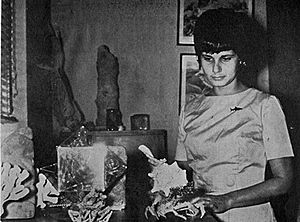Idelisa Bonnelly facts for kids
Quick facts for kids
Idelisa Bonnelly de Calventi
|
|
|---|---|
 |
|
| Born |
Idelisa Bonnelly Peralta
10 September 1931 Santiago de los Caballeros, Dominican Republic
|
| Died | 3 July 2022 (aged 90) |
| Spouse(s) | Vinicio Calventi Gaviño |
| Relatives | Rafael Calventi Gaviño (brother-in-law) Arambilet (nephew-in-law) Rafael F. Bonnelly (second-cousin once-removed) |
| Academic background | |
| Alma mater | Columbia University New York University |
| Academic work | |
| Institutions | Universidad Autónoma de Santo Domingo Research Center of Marine Biology Dominican Foundation for Marine Research |
| Main interests | marine biologist |
| Notable works | created the first sanctuary for humpback whales |
Idelisa Bonnelly de Calventi (born September 10, 1931 – died July 3, 2022) was a famous Dominican scientist. She was a marine biologist, someone who studies ocean life. Many people call her the "mother of marine conservation in the Caribbean". This means she helped protect the oceans and sea creatures in the Caribbean region.
Idelisa Bonnelly started the study of biology in the Dominican Republic. She also created important groups like the Institute of Marine Biology. She helped make the first safe place for humpback whales in the North Atlantic Ocean. She won many awards for her work, including the UNESCO Marie Curie Medal. The BBC even said she was one of the most important women scientists in Latin America.
Contents
About Idelisa Bonnelly
Idelisa Bonnelly was born on September 10, 1931. Her hometown was Santiago de los Caballeros in the Dominican Republic. She loved marine biology, but there were no schools for it there. So, she went to New York to study at a university.
Her Education and Early Work
In 1953, she started studying at Columbia University. She earned her degree in marine biology in 1956. Later, in 1961, she got her master's degree from New York University. After finishing school, she worked at the New York Aquarium. She was a research assistant there.
Bringing Biology to the Dominican Republic
In 1962, Idelisa Bonnelly returned to her home country. She began teaching at the Universidad Autónoma de Santo Domingo (UASD). She started the very first place to study biology in the Dominican Republic. In 1966, she created the Institute of Marine Biology. This institute later became the Research Center of Marine Biology (CIBIMA). She taught there for many years.
Protecting Ocean Life
Idelisa Bonnelly did a lot to protect the ocean. She helped create important rules and plans.
Creating Protected Areas
In 1974, she helped start the Academy of Sciences of the Dominican Republic. She also wrote many important papers. These papers helped people understand how to protect ocean resources. In 1986, she played a big part in creating the first protected area for humpback whales. It was first called the Humpback Whale Sanctuary on the Silver Bank. Today, it's known as the Santuario de los Bancos de la Plata y la Navidad.
Awards for Her Conservation Work
For her work with whales, she received several awards. The Dominican Republic government gave her the Medal of Merit for Women in Science in 1986. She also won the National Science Prize in 1987. The United Nations Environment Programme (UNEP) added her to their Global 500 Roll of Honour that same year.
Continuing Her Important Work
In 1990, she became a special professor at UASD. In 1991, she created the Dominican Foundation for Marine Research (FUNDEMAR). This group helps manage marine areas and studies ocean life. It also looks after the Marine Mammal Sanctuary. That same year, she joined the Organization for Women in Science for the Developing World. She kept writing, and her ideas helped shape Environmental Law for oceans.
More Recognition and Honors
Idelisa Bonnelly received many more awards. She became an academic laureate in 2007. She got a National Ecology Award in 2008. In 2009, UNESCO gave her the Marie Curie Medal. In 2010, she received a Distinguished Service Award in Biology from Canada. In 2011, her own government gave her the Order of Merit of Duarte, Sánchez and Mella. The BBC recognized her in 2013 as one of the ten most important women scientists in Latin America.
Idelisa Bonnelly passed away on July 3, 2022, at the age of 90. Her work continues to protect the oceans.
Awards and Honors
- 1986 Medal of Merit for Women in Science, Government of the Dominican Republic
- 1987 National Science Prize, Academy of Sciences of the Dominican Republic
- 1987 Global 500 Roll of Honour, United Nations Environment Programme (UNEP)
- 1990 Meritorious Professor, Autonomous University of Santo Domingo
- 2007 Academic Laureate, Academy of Sciences of the Dominican Republic
- 2008 National Ecology Award, Fundación Corripio
- 2009 Marie Curie Medal, UNESCO
- 2010 Distinguished Service Award in Biology (SCB), Society for the Conservation of Biology, Victoria, Canada
- 2011 Order of Merit of Duarte, Sánchez and Mella, Government of the Dominican Republic
See also
 In Spanish: Idelisa Bonnelly para niños
In Spanish: Idelisa Bonnelly para niños
 | William L. Dawson |
 | W. E. B. Du Bois |
 | Harry Belafonte |

